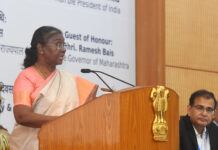
Study in Lancet Oncology highlights gaps in smokeless tobacco control; says its not taxed in many countries, health warnings often not enforced
A paper published today in Lancet Oncology describes the extent of the policy implementation gap in smokeless tobacco (SLT) control – for India smokeless tobacco is a major problem.
Professor Ravi Mehrotra, Director of the National Institute of Cancer Prevention and Research (ICMR-NICPR), India and the lead author of the paper said “Smokeless tobacco use as a public health concern requires a comprehensive approach to deal with the challenges identified in the paper. In this regard, the WHO Framework Convention on Tobacco Control Global Knowledge Hub on Smokeless Tobacco (https://untobaccocontrol.org/kh/smokeless-tobacco/) at ICMR-NICPR is committed to assisting all countries in implementing the key recommendations from the paper.”
Smokeless tobacco kills over half a million adults worldwide.There are approximately 1, 10 crore tobacco users in the world and almost a third of them (35.6 crore) use tobacco in the form of smokeless tobacco products. Smokeless tobacco refers to tobacco products that are consumed without smoking usually through mouth and nose.
Smokeless tobacco kills over half a million adults worldwide.There are approximately 1, 10 crore tobacco users in the world and almost a third of them (35.6 crore) use tobacco in the form of smokeless tobacco products
Smokeless tobacco products are highly addictive and most are known to cause cancers of the mouth and neck, as well as heart disease and health problems for pregnant women. Smokeless tobacco products contain high levels of nicotine as well as cancer producing toxic chemicals. It contains more than 3000 chemicals of which about 30 are cancer causing. As a result, head and neck cancers are very common in those who consume such smokeless tobacco products. In India, where smokeless tobacco products are common, socially acceptable and part of cultural use, mouth cancer is the leading cause of cancer-related deaths. Almost 90% of the oral cancers in India are due to use of smokeless tobacco. Smokeless tobacco use is also very common among females and is more socially acceptable than the use of cigarettes in the country.
An older study by NICPR found that the carcinogenicity of smokeless tobacco varies from country to country. It concluded: “A study (of SLT and oral cancer link) which included the United States, Sweden, and India together found that the risk of oral cancer from SLT use was due to the inclusion of Indian studies, since when analyzed separately excluding India no such risk was found for US and Swedish studies. Most of the studies found no or negligible risks as far as European studies are concerned. Some other studies showed an increased risk for the United States, but not for the European region.”
Prof Balram Bhargava, Secretary, Department of Health Research, Government of India and Director General ICMR, New Delhi said, “Given the extent and multiple faces of SLT in India (almost 65% of the world SLT users are in India), the need of the hour is to undertake a national mission to fight SLT use by bringing together all stakeholders under one umbrella. In this regard, ICMR envisages a comprehensive and scientific approach to reduce the SLT burden of the country.”
Important Findings of the present paper:
- Only 138 countries define smokeless tobacco in their statutes.
- Only 34 countries have so far reported levying a tax on smokeless tobacco products.
- Just six countries check and regulate the content of smokeless tobacco products.
- Only 41 countries mandate pictorial health warnings on these products.
- There are only a handful of public awareness campaigns on the harms associated with tobacco so far.
- Only 16 countries have implemented a comprehensive ban on smokeless tobacco advertisement, promotion and sponsorships.
- Globally, fewer smokeless tobacco users are advised to quit vis-à-vis smokers.














[…] Professor Ravi Mehrotra, Director of the National Institute of Cancer Prevention and Research (ICMR-NICPR), India and the lead author of the paper said “Smokeless tobacco use as a public health concern requires a comprehensive approach to deal with the challenges identified in the paper. In this regard, the WHO Framework Convention on Tobacco Control Global Knowledge Hub on Smokeless Tobacco (https://untobaccocontrol.org/kh/smokeless-tobacco/) at ICMR-NICPR is committed to assisting all countries in implementing the key recommendations from the paper.” Read More […]
Comments are closed.